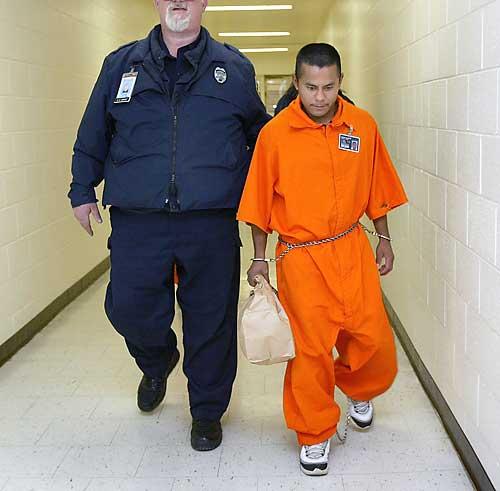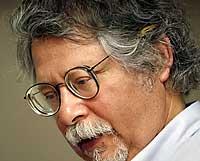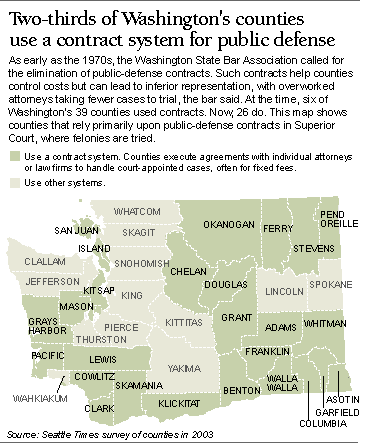 |
 |
 |
|
|
Sunday, April 4, 2004 By Ken Armstrong, Florangela Davila and Justin Mayo Seattle Times staff reporters (Lawyer disciplinary hearing, November 2002) Some lawyers command a courtroom. Guillermo Romero shuffles around it, head down and voice low, shrinking as an unprepared student avoiding the professor's eye. For more than eight years, he worked as a public defender in Central Washington's Grant County. To as many as 1,000 clients — poor, desperate, often despised — he was all that stood between an accusation and prison. He was supposed to punch holes in weak cases, to intercept police and prosecutors when they ran afoul, to investigate and analyze and advocate. But legal basics eluded him. In a rape case, he once filed a motion seeking "D and A testing." What he meant was DNA. He gave lousy advice, according to disciplinary officials. You can't appeal, he told one client, when the client certainly could. You can leave the country before trial, he told another, when the client certainly could not. He allowed the state to take liberties. He didn't object when a prosecutor compared his client to Hitler. He didn't object when the same prosecutor argued that everyone who goes to rock concerts uses drugs. He didn't object when police transcribed the tape-recorded statement of a teenage murder suspect and inserted damning words the boy never uttered. Romero couldn't object, because he had never bothered to listen to his client's taped confession. The last time Romero won a trial in Grant County Superior Court was in 1997, according to court documents. His record since then is zero and 23. Twice, reviewing courts ruled that he was so incompetent, the adversarial system had collapsed. Four decades ago, in the celebrated case of Gideon v. Wainwright, the U.S. Supreme Court promised to turn a noble ideal into more than just words. By ruling that defendants too poor to hire their own attorney must be provided one at public expense, the court reaffirmed that all people accused of crime must stand equal before the law.
Grant County is Gideon's lie.
Two-thirds of Washington counties, including Grant, pay for public defense through contracts that typically pay a fixed amount no matter how many cases come through their courts. That can leave public defenders less time per case, and lead to adversarial breakdowns. Warnings about such contracts have been sounded for three decades, but the state has refused to enforce public-defense standards or to help fund indigent defense at the trial level except in extraordinary cases. Last spring, Romero quit working as a public defender; he is waiting for the Washington Supreme Court to decide whether to strip him of his law license. But how did he land such a crucial job in the first place? And how did he keep it for so long?
THE RIGHT TO COUNSEL Winston Churchill once said there is no better test of a country's virtue than the respect it shows for the criminally accused. By that measure, the United States has long counted itself virtuous.
"The right of one charged with crime to counsel may not be deemed fundamental and essential to fair trials in some countries, but it is in ours," the U.S. Supreme Court wrote in 1963.
In 1961, in a coastal town on Florida's panhandle, police tracked Gideon, a 50-year-old drifter with an eighth-grade education, to a bar and emptied his pockets. They found $25.28, all in change. To police, this confirmed a tipster's claim that Gideon had burglarized a pool hall, stealing coins from a jukebox and a cigarette machine. Gideon said the change was evidence only of a good night at penny-ante cards. But with four prior felony convictions, mostly for stealing, he would need help convincing a jury of his innocence. Too poor to hire a lawyer, he asked the court to provide him one. When a judge refused, Gideon was left to defend himself. He was found guilty of breaking and entering — a felony — and sentenced to five years in prison. That's where he penciled a plea to the Supreme Court, demanding the right to an attorney, no matter his means. In oral argument before the high court, appellate lawyers argued on Gideon's behalf that an adversarial system of justice demands adversaries: From the clash of skilled lawyers, truth emerges. In 1963, a unanimous Supreme Court agreed, saying the Sixth Amendment guarantee of counsel applies to state courts and entitles indigent defendants to an attorney at public expense. That same year, Gideon's retrial moved the principle beyond abstraction. Gideon's court-appointed attorney, W. Fred Turner, spent three days investigating the crime and dug up evidence suggesting that the police tipster was the actual thief. This time, Gideon was acquitted. While Clarence Gideon may not be a household name, his legacy can be recited by anyone who watches television: You have the right to an attorney. If you cannot afford an attorney, one will be provided to you. It became a core part of the 1966 Miranda ruling, which required police to inform suspects of their rights. Affording counsel to the poor is intended to protect innocent defendants. But it reaches beyond individuals to protect the credibility of the justice system by insisting it be blind to wealth and influence, and to protect society itself by checking the power of police and prosecutors. Turner stated it more simply: "There but for the grace of God go I," he said in an interview shortly before his death last November at age 81. Stephen Bright, director of the Southern Center for Human Rights in Atlanta, calls Gideon "one of the most universally accepted Supreme Court decisions." But Bright, who teaches law at Yale and Harvard universities, offers this caution: No constitutional right presents a greater divide between promise and reality. "We wax poetically about justice for all, and on Law Day attorneys get together and reminisce about Fred Turner representing Clarence Gideon at his retrial and winning an acquittal," Bright says. "And yet you go into courthouses all over the country, and what you see is not at all what is being celebrated. What you see is people being processed like widgets on an assembly line."
ROMERO IS HIRED (ROUND 1) That assembly-line justice can be linked, in part, to fixed-fee contract systems that limit what public-defense attorneys are paid, regardless of their caseload or time investment. That financial disincentive, in turn, limits the number of lawyers willing to do that work. In Grant County, Guillermo Romero was willing — and cheap — and was hired time and again despite an array of his own legal troubles, a demonstrated lack of skill in the courtroom and a chorus of complaints from clients. He was first hired in Grant County in late 1994 by John Luke McKean, who then held a subcontract to handle half of the county's court-appointed felony cases. For that work, McKean received $120,000 a year. In turn, McKean subcontracted with other lawyers, for substantially less money, to handle his cases. That left him free to take on private, or paying, clients. Subcontractors were not easy to come by. In 1991, McKean hired Eric Weston fresh out of law school to handle felony cases — something frowned upon by bar groups. "It was pretty traumatic," says Weston, now a public defender in King County. McKean "told me the best way to learn was sink or swim." In 1994, when McKean hired Romero, all he knew was that Romero had practiced law in Yakima and was Hispanic — a plus in a county with a large Hispanic population. "I didn't know anything about him," McKean says. "And I should have been more careful."
|
|
|||||||||||||||||||||
seattletimes.com home
Home delivery
| Contact us
| Search archive
| Site map
| Low-graphic
NWclassifieds
| NWsource
| Advertising info
| The Seattle Times Company



